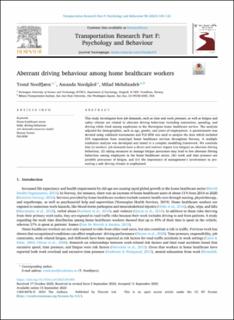Aberrant driving behaviour among home healthcare workers
Peer reviewed, Journal article
Published version
Permanent lenke
https://hdl.handle.net/11250/3110539Utgivelsesdato
2023Metadata
Vis full innførselSamlinger
- Institutt for psykologi [3103]
- Publikasjoner fra CRIStin - NTNU [38127]
Originalversjon
Transportation Research Part F: Traffic Psychology and Behaviour. 2023, 98 104-122. 10.1016/j.trf.2023.09.005Sammendrag
This study investigates how job demands, such as time and work pressure, as well as fatigue and safety climate are related to aberrant driving behaviour including inattention, speeding, and driving while tired among employees in the Norwegian home healthcare service. The analysis adjusted for demographics, such as age, gender, and years of employment. A questionnaire was devised using validated instruments and PLS-SEM was used to analyse the data which included 210 respondents from municipal home healthcare services throughout Norway. A multiple mediation analysis was developed and tested in a complex modelling framework. We conclude that (i) workers' job demands have a direct and indirect impact (via fatigue) on aberrant driving behaviour, (ii) taking measures to manage fatigue precursors may lead to less aberrant driving behaviour among employees in the home healthcare sector, (iii) work and time pressure are possible precursors of fatigue, and (iv) the importance of management's involvement in promoting a safe driving climate is emphasised.

